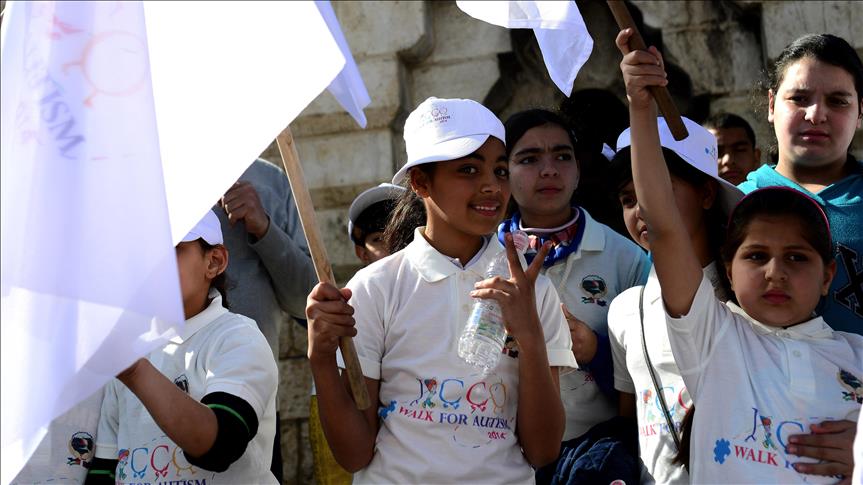
South Africa
By Shu’eib Hassen
CAPE TOWN, South Africa
Primrose Mooi’s daughter was only two when she was diagnosed with autism. “It was not easy. Where I am from they do not know of autism and they discriminate, oppress, and abuse,” Mooi tells Anadolu Agency.
Mooi’s daughter is but one of the children born every 45 minutes who will develop autism in South Africa. This translates to four percent of the population, according to Autism South Africa.
“The hospitals are the worst," Mooi says. "They do not know how to handle an autistic child, so they skip your child for any treatment and such.”
Travelling between clinics from the township of Khayelitsha, she eventually arrived at a local hospital where, after a few days of revisits, was told that her daughter has autism spectrum disorder. She got in contact with Autism Western Cape’s support group.
Anadolu Agency spoke to campaigners and health officials in the week which saw World Autism Day bring the neuro-developmental disorder back into the headlines.
Social stigma
“I am not too upset from the criticism and stigma received in my area. It was their negative words that got me up to check what was wrong with my daughter. I was too busy being excited at having our first child with my husband,” says Mooi.
A 2015 South African study revealed that social stigma was worst towards ‘Black African groups’ suffering from autism that are often residing in lower socio-economic areas where there is a significant lack of awareness about the condition which can impede communication, socialization, thought processes, as well as behavior.
Autism South Africa’s National Education Facilitator, Vicky Lamb, says: “Due to cultural beliefs in these areas, it is often blamed on supernatural means like witchcraft which furthers the difficulty for those with autism to create social relationships.”
With only one expensive private school in the province equipped to properly help autistic children, Mooi began dedicating more of her time in gaining skills to become a better carer and teacher to her daughter.
Special Needs Educator Cathryn Albertyn says such specialized teaching requires substantial funding: “The specialized schools are not cheap. The teacher ratio is often one to six or eight students. This means that six or eight students must pay the salary of one teacher. Prices are then further inflated by an accompanying assistant and increased equipment.”
Mooi’s situation took a turn for the worse her husband died, eroding her support base and household income.
This left her with the painstaking process of applying for a social grant while undertaking two part-time jobs; one as a domestic cleaner and the other managing support groups for Autism Western Cape.
“It can take up to 18 months for the social grant system to acknowledge that your child has autism. That is 18 months with no financial support for a costly disability,” says Autism Western Cape Education and Outreach Manager, Keri Delport. “There are no physical visible indications to recognize autism and this often causes unnecessary complications in obtaining a grant.”
Rather than fall into despair Mooi became determined to be part of the solution. In February this year she opened her own education center for autistic children in her backyard in Khayelitsha. Starting with three children, within less than two months it had increased to 11 pupils.
Mooi says: “It is difficult without any funding. The children live 30 minutes away from each other and I need to collect each one of them. They are unable to take public transport by themselves.”
Only 0.01% of autistic children in South Africa are in school. Those admitted into non-specialized schools struggle immensely coping with the syllabus and are often held back.
Autism Western Cape’s Keri Delport says: “Autistic children’s brains are wired differently. They have difficulty with social skills, communication, and understanding body_abstract concepts. General educators are not trained in teaching methods to connect ideas and constructs with them.”
Vicky Lamb says that the absence of government acknowledgement on autism thus leads to neglect. Last year horror struck anxious parents who had placed their hopes in a false cure.
“The illegal product ‘Miracle Mineral Solution’ was marketed to cure autism, but it led to seriously severe health risks,” says Lamb.
“The medical tests revealed that this was, in fact, industrial bleach. Although it has been banned, there are still similar products advertising themselves as a cure for autism in rural store shelves,” said Lamb.
Autism Western Cape spokesperson Michelle Basset adds: “There are those who still try desperate measures because they simply have not been properly informed about autism.”
Awareness
Awareness walks like one held in Cape Town on April 2, to highlight World Autism Day, seek to increase public knowledge about the incurable mental disorder.
The third annual Autism Awareness Walk attracted over 250 participants while collecting funds for their mentorship program.
Advocating the necessity for autism research to consider the conditions of low and middle-income countries, Prof. Petrus de Vries, Academic Head of Clinical Services at the University of Cape Town, wrote this month that most work into the condition was done from high-income countries.
De Vries argued that the scientific community should start thinking more “globally” to make research efforts “applicable, appropriate, transferable and scalable” to people in all countries.
According to Delport, the research deficiency on autism in South Africa fuels a vicious cycle where lack of awareness and acknowledgement inhibits the development of specialized facilities and services, especially when autism prevalence rates increase annually by between 10 – 17 percent.
In the meantime, Mooi is hoping for government funding for her rapidly expanding autism center. In the near future, she plans on running support groups and awareness programs to neighboring communities.
Anadolu Agency website contains only a portion of the news stories offered to subscribers in the AA News Broadcasting System (HAS), and in summarized form. Please contact us for subscription options.






